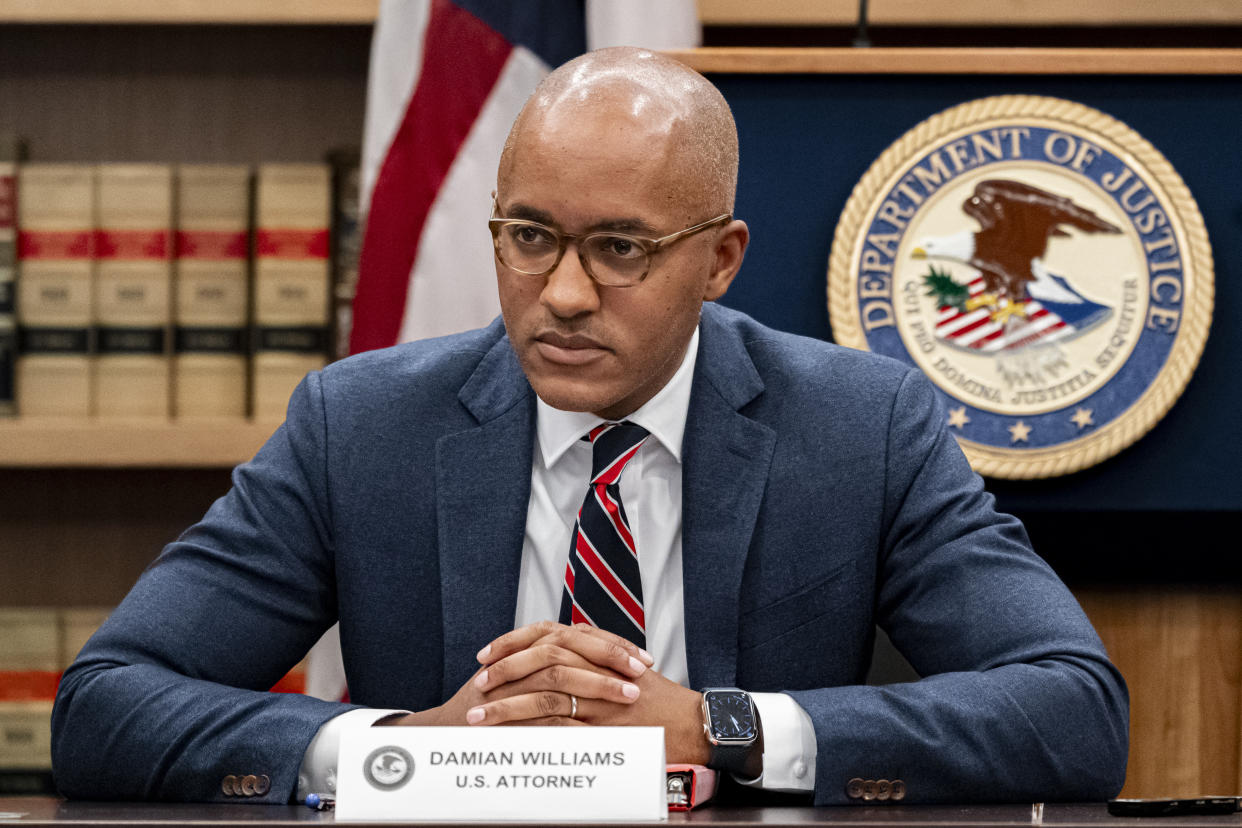Menendez guilty verdicts give New York prosecutors a win after high-profile setbacks

- Oops!Something went wrong.Please try again later.
- Oops!Something went wrong.Please try again later.
NEW YORK — A sitting U.S. senator, stacks of gold bars and a clean sweep of guilty verdicts on 16 federal fraud, bribery and extortion counts: For federal prosecutors in the Manhattan U.S. Attorney’s Office, Tuesday’s conviction of Sen. Bob Menendez was perhaps the biggest public corruption win in years.
In rendering Menendez guilty of bribery, acting as a foreign agent for Egypt, obstruction, extortion and conspiracy, the trial marked the undoing of one of the most influential people in Washington and left him facing the possibility of decades in prison.
And it was a sigh of relief for the public corruption unit in the Manhattan U.S. Attorney’s Office, which has seen mixed results on cases involving public officials, stemming in large part from Supreme Court rulings that have narrowed the federal statutes that can be used to pursue alleged corruption.
“These convictions were critical for my former office,” Andrew Goldstein, a former chief of the public corruption unit who also served as top deputy to former special counsel Robert Mueller in his investigation of Russian interference in the 2016 presidential election, said of Menendez and his co-defendants.
“They show that even after enforcement of public corruption laws has been significantly curtailed by the Supreme Court, the government can still bring and win important cases against high-level government officials,” Goldstein said.
The Menendez case “is definitely a sort of signature case for the office and for [Manhattan U.S. Attorney] Damian Williams and for the idea that there are types of public corruption that still seem likely to stand up” in court, said Martin Bell, a former public corruption prosecutor in the office.
Last year, the Supreme Court overturned one of the unit’s biggest victories: the Manhattan conviction of a former aide to former Gov. Andrew Cuomo. In that decision, the court restricted the use of a federal statute that makes it a crime to deprive the public of “honest services.”
In years prior, federal appeals courts overturned the high-profile convictions of the leaders of the New York state Legislature in the wake of another Supreme Court ruling that narrowed the definition of corruption, although both men were later retried and convicted again.
The office notched the conviction of a sitting member of Congress, then-Rep. Chris Collins, after he pleaded guilty in 2019, although that was an insider trading case handled by the securities fraud unit. And that guilty plea didn’t stick: On his way out of office in late 2020, then-President Donald Trump pardoned Collins.
There have been other challenges, too. The office charged then-Lt. Gov. Brian Benjamin with corruption, but a judge threw out the bribery charges. An appeals court later reversed the judge’s ruling, but not before the cooperating witness in the case died. Benjamin is seeking to have the Supreme Court review his case.
And prosecutors secured a guilty plea from Trump’s former “fixer” and lawyer Michael Cohen — a significant success that likely paved the way for his testimony in Trump’s Manhattan criminal trial, which ended in the former president’s conviction. At the time of Cohen’s plea, however, Trump was still president, and the position of the Justice Department’s Office of Legal Counsel has been that a sitting president can’t be criminally prosecuted.
In the case of Menendez, prosecutors appear to have had the Supreme Court rulings in mind when they crafted the indictment, using language in the charging papers that was drawn from the high court’s decision to throw out the conviction of former Virginia Gov. Bob McDonnell.
In remarks shortly after the verdict, Williams appeared to drive home the notion that Menendez’s conduct rose above the bar set by the court. Describing the case as depicting “shocking levels of corruption,” Williams added: “This wasn’t politics as usual; this was politics for profit.”
The jury verdict was certainly momentous for the New Jersey Democrat, who survived an earlier indictment after a mistrial in 2017 and who fought the recent charges aggressively, saying prosecutors were “hunting” him like “prey.”
Daniel Richman, a Columbia Law School professor and an alumnus of the Manhattan U.S. Attorney’s Office, said that “the Southern District has learned the hard lesson of not being able to take its convictions for granted.”
Richman said prosecutors have pursued cases that, to most observers, involve clear-cut fraud or bribery and appear to put them on solid ground for guilty verdicts.
“They look that way to a prosecutor troubled by [the] conduct, and they look that way to juries,” Richman said. “What they’ve run into in recent years are the very granular demands the Supreme Court has made in terms of the ways these cases can be pursued.”
Those demands are now what Menendez will likely be banking on, hoping to become another public corruption defendant rescued by an appellate ruling.
Minutes after the verdict, Menendez attorney Adam Fee told reporters: “There are grave appellate problems with this case and with this verdict, and we’re going to pursue all appellate avenues aggressively.”

